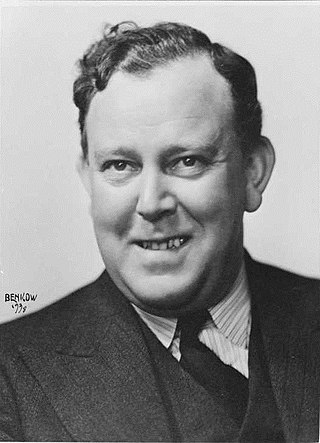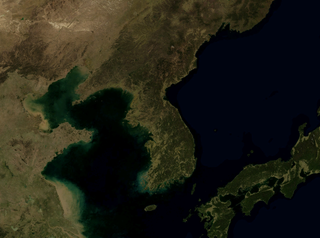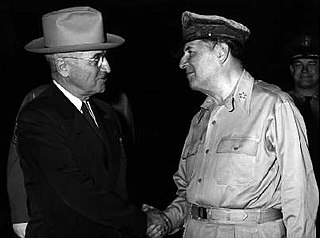
The United Nations Security Council (UNSC) is one of the six principal organs of the United Nations (UN) and is charged with ensuring international peace and security, recommending the admission of new UN members to the General Assembly, and approving any changes to the UN Charter. Its powers as outlined in the United Nations Charter include establishing peacekeeping operations, enacting international sanctions, and authorizing military action. The UNSC is the only UN body with authority to issue resolutions that are binding on member states.
A United Nations General Assembly resolution is a decision or declaration voted on by all member states of the United Nations in the General Assembly.

Trygve Halvdan Lie was a Norwegian politician, labour leader, government official and author. He served as Norwegian foreign minister during the critical years of the Norwegian government in exile in London from 1940 to 1945. From 1946 to 1952 he was the first secretary-general of the United Nations.

United Nations Security Council Resolution 678 was adopted on 29 November 1990. After reaffirming resolutions 660, 661, 662, 664, 665, 666, 667, 669, 670, 674 and 677, the council noted that despite all the United Nations efforts, Iraq continued to defy the Security Council.

The history of the United Nations has its origins in World War II beginning with the Declaration of St James's Palace. Taking up the Wilsonian mantle in 1944–1945, US President Franklin D. Roosevelt pushed as his highest postwar priority the establishment of the United Nations to replace the defunct League of Nations. Roosevelt planned that it would be controlled by the United States, Soviet Union, United Kingdom and China. He expected this Big Four would resolve all major world problems at the powerful Security Council. However the UN was largely paralyzed by the veto of the Soviet Union when dealing with Cold War issues from 1947 to 1989. Since then its aims and activities have expanded to make it the archetypal international body in the early 21st century.

The United Nations Security Council veto power is the power of the five permanent members of the UN Security Council to veto any decision other than a "procedural" decision.
United Nations General Assembly (UNGA) resolution 377 A, the "Uniting for Peace" resolution, states that in any cases where the Security Council, because of a lack of unanimity among its five permanent members (P5), fails to act as required to maintain international security and peace, the General Assembly shall consider the matter immediately and may issue appropriate recommendations to UN members for collective measures, including the use of armed force when necessary, in order to maintain or restore international security and peace. It was adopted 3 November 1950, after fourteen days of Assembly discussions, by a vote of 52 to 5, with 2 abstentions. The resolution was designed to provide the UN with an alternative avenue for action when at least one P5 member uses its veto to obstruct the Security Council from carrying out its functions mandated by the UN Charter.

United Nations Command is the multinational military force established to support the Republic of Korea during and after the Korean War. It was the first international unified command in history, and the first attempt at collective security pursuant to the Charter of the United Nations.

United Nations Security Council resolution 825, adopted on 11 May 1993, called upon the Democratic People's Republic of Korea to reconsider its decision to withdraw from the Treaty on the Non-Proliferation of Nuclear Weapons and allow weapons inspectors from the International Atomic Energy Agency (IAEA) into the country, after it had previously refused entry.

Resolution 82 was adopted by the United Nations Security Council (UNSC) on 25 June 1950. It condemned the "armed attack on the Republic of Korea by forces from North Korea", while calling for "the immediate cessation of hostilities" and for "the authorities in North Korea to withdraw forthwith their armed forces to the 38th parallel". The measure was adopted with 9 voting for, none opposed, and one abstention by Yugoslavia. The Soviet Union was absent, as it was boycotting the UN at the time for its recognition of the Republic of China as China's representative to the organization.

United Nations Security Council Resolution 83, adopted on June 27, 1950, determined that the attack on the Republic of Korea by forces from North Korea constituted a breach of the peace. The Council called for an immediate cessation of hostilities and for the authorities in North Korea to withdraw their armed forces to the 38th parallel. They also noted the report by the United Nations Commission on Korea that stated North Korea's failure to comply with Security Council Resolution 82 and that urgent military measures were required to restore international peace and security.

The United Nations Security Council Resolution 84, adopted on July 7, 1950, was the United Nations Security Council resolution which authorized the formation of the United Nations Command to provide military support for South Korea, following a North Korean invasion and offensive at the outbreak of the Korean War.

On 11 April 1951, U.S. president Harry S. Truman relieved General of the Army Douglas MacArthur of his commands after MacArthur made public statements that contradicted the administration's policies. MacArthur was a popular hero of World War II who was then commander of United Nations Command forces fighting in the Korean War, and his relief remains a controversial topic in the field of civil–military relations.

United Nations General Assembly Resolution 62/243, titled "The Situation in the Occupied Territories of Azerbaijan", is a resolution of the United Nations General Assembly about the situation in Nagorno-Karabakh, which was adopted on March 14, 2008 at the 62nd session of the General Assembly. It became the seventh United Nations document concerning Nagorno-Karabakh and the third and last United Nations General Assembly document on it.

The permanent members of the United Nations Security Council are the five sovereign states to whom the UN Charter of 1945 grants a permanent seat on the UN Security Council: China, France, Russia, United Kingdom, and United States.

The Republic of Korea and the Democratic People's Republic of Korea were simultaneously admitted to the United Nations (UN) in 1991. On 8 August 1991, the UN Security Council passed Resolution 702, recommending both states to the General Assembly for membership. On 17 September 1991, the General Assembly admitted both countries under Resolution 46/1.
Ukraine was one of the founding members of the United Nations when it joined in 1945 as the Ukrainian Soviet Socialist Republic; along with the Byelorussian Soviet Socialist Republic, Ukraine signed the United Nations Charter when it was part of the Soviet Union. After the dissolution of the Soviet Union in 1991, the newly independent Ukraine retained its seat.
United Nations General Assembly Resolution 48/144 of 20 December 1993 is a resolution in which the General Assembly expressed its concern at the ongoing degradation of the humanitarian situation in Azerbaijan because of the displacement of considerable number of citizens due to Nagorno Karabakh conflict and supporting "emergency international assistance to refugees and displaced persons in Azerbaijan". The resolution is titled “48/114. Emergency international assistance to refugees and displaced persons in Azerbaijan”. It became the fifth United Nations document concerning Nagorno-Karabakh and the first United Nations General Assembly document on humanitarian aid to those affected by this conflict. This resolution was the first international document affirming the number of refugees and displaced persons in Azerbaijan exceeded one million. The document does not make any specific reference to previous UN resolutions on the ongoing conflict, but "its relevant resolutions regarding humanitarian assistance to refugees and displaced persons". The resolution was adopted by consensus without voting.

United Nations Command–Rear is a military command headquartered in Japan, and a subordinate element of United Nations Command. UN Command–Rear was established in 1957 as a result of the relocation of UN Command from Japan to South Korea following the Korean War. It is in control of the rear elements the United Nations Command.

















